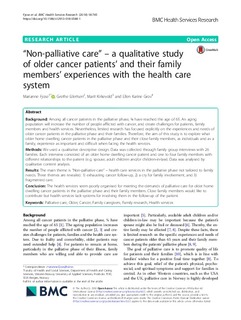| dc.contributor.author | Fjose, Marianne | |
| dc.contributor.author | Eilertsen, Grethe | |
| dc.contributor.author | Kirkevold, Marit | |
| dc.contributor.author | Grov, Ellen K. | |
| dc.date.accessioned | 2020-01-31T08:13:53Z | |
| dc.date.available | 2020-01-31T08:13:53Z | |
| dc.date.issued | 2018 | |
| dc.identifier.citation | Fjose, M. et al. (2018): «Non-palliative care» - a qualitative study of older cancer patients`and their family members’ experiences with the health care system, BMC Health Services Research 18(1), 745. | nb_NO |
| dc.identifier.uri | http://hdl.handle.net/11250/2638963 | |
| dc.description.abstract | Background
Among all cancer patients in the palliative phase, ¾ have reached the age of 65. An aging population will increase the number of people afflicted with cancer, and create challenges for patients, family members and health services. Nevertheless, limited research has focused explicitly on the experiences and needs of older cancer patients in the palliative phase and their families. Therefore, the aim of this study is to explore what older home dwelling cancer patients in the palliative phase and their close family members, as individuals and as a family, experience as important and difficult when facing the health services.
Methods
We used a qualitative descriptive design. Data was collected through family group interviews with 26 families. Each interview consisted of an older home dwelling cancer patient and one to four family members with different relationships to the patient (e.g. spouse, adult children and/or children-in-law). Data was analysed by qualitative content analysis.
Results
The main theme is “Non-palliative care” – health care services in the palliative phase not tailored to family needs. Three themes are revealed: 1) exhausting cancer follow-up, 2) a cry for family involvement, and 3) fragmented care.
Conclusion
The health services seem poorly organised for meeting the demands of palliative care for older home dwelling cancer patients in the palliative phase and their family members. Close family members would like to contribute but health services lack systems for involving them in the follow-up of the patient. | nb_NO |
| dc.publisher | BMC Health Services Research | nb_NO |
| dc.rights | Navngivelse 4.0 Internasjonal | * |
| dc.rights.uri | http://creativecommons.org/licenses/by/4.0/deed.no | * |
| dc.subject | palliative care | nb_NO |
| dc.subject | older | nb_NO |
| dc.subject | cancer | nb_NO |
| dc.subject | family caregivers | nb_NO |
| dc.subject | family research | nb_NO |
| dc.subject | health services | nb_NO |
| dc.title | “Non-palliative care” – a qualitative study of older cancer patients’ and their family members’ experiences with the health care system | nb_NO |
| dc.type | Journal article | nb_NO |
| dc.source.pagenumber | 745 | nb_NO |
| dc.source.volume | 18 | nb_NO |
| dc.source.journal | BMC Health Services Research | nb_NO |
| dc.source.issue | 1 | nb_NO |
| dc.identifier.doi | https://doi.org/10.1186/s12913-018-3548-1 | |

